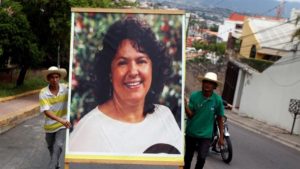By: Justin Furry
Special Feature Reporter
Gender stereotypes and discrimination is an issue that has been in societies across the world. Recently, gender discrimination has been a big problem in Guatemala. Guatemala has one of the highest rates of femicide, or gender motivated killings of women, in the world. The Inter-American Court of Human Rights was able to explore the relationship between this discrimination and violence towards women in Guatemala in the 2015 case Velásquez Paiz et al. v. Guatemala.
On August 12, 2005, Claudina Isabel Velásquez Paiz, a 19-year-old student, went to a party. Throughout the evening, Claudina was regularly in contact with her parents. At around 11:45 pm, Claudina contacted her parents for the last time. Two hours later, Claudina’s parents were informed that their daughter may be in danger. They called the police, who told them that they would have to wait at least 24 hours to report Claudina’s disappearance. Claudina’s parents and friends searched for her throughout the night. The police did not formally take notice of Claudina’s disappearance until 8:30 am the next morning.
Shortly after, an anonymous tip provided information that helped police and firemen find a woman’s body. The body was later identified as Claudina by her parents. Claudina was found with a bullet wound on her forehead, as well as signs of sexual violence. There is no evidence that the Public Ministry of Guatemala or the police had undertaken any action following information of Claudina’s disappearance, except for the report made at 8:30 am on August 13, 2005. No criminal investigation was initiated until after Claudina’s body was found.
The Inter-American Court of Human Rights found that Guatemala was responsible for violating Claudina and her family’s human rights. The judgment is important because it casts further light on what specific steps are necessary for a state to satisfy its due diligence obligations within the particular context of violence against women. The Court acknowledged that Guatemala had taken some measures to prevent the generalized violence of woman in society, but the measures were far from sufficient. The Court said that whenever a report is made to the police about a missing woman, a duty of strict due diligence arises from the very first hours of the disappearance. Thus, the Court ruled that Guatemala had violated Articles 4.1, 5.1, 1.1 of the American Convention on Human Rights (“ACHR”) and Articles 1.1 and 7 of the Inter-American Convention on the Prevention, Punishment and Eradication of Violence Against Women (“IACVAW”).
The Court also found that the lack of a fundamental due diligence on the part of Guatemalan officials throughout the investigation process had deprived Claudina’s family access to justice in violation of Articles 8.1 and 25 of the ACHR. The Court criticized the investigation and thought the process was directed at the culture of gender bias and discrimination prevalent within both the police and prosecuting authorities. One discriminatory practice the Court considered was a report filed by the prosecutor in which the motive of the murder was described as “passionate possibly under the influence of alcohol”. The Court relied on the statements of Professor Christine Chinkin, Director of the Centre for Women, Peace and Security, at the LSE. Professor Chinkin cautioned against the concept of a “crime of passion” which is founded on gender stereotyping that justifies violence against women. To describe the murderer as “passionate” justifies the violent act and at the same time blame the victim. The Court noted that the prosecutor’s attitude was not exclusive to the authorities leading the investigation but, rather, reflected a general tendency among officials to victim blame by pointing out factors such as the victim’s lifestyle or clothing.
The judgment represents one example of the way in which the due diligence standard has the potential to address the causes of gender discrimination and violence against women.
For further information please see:
IACHR Project – Velásquez Paiz et al. v. Guatemala, Case Summary – 2015
Centre For Women, Peace & Security – Velásquez Paiz et al v. Guatemala

